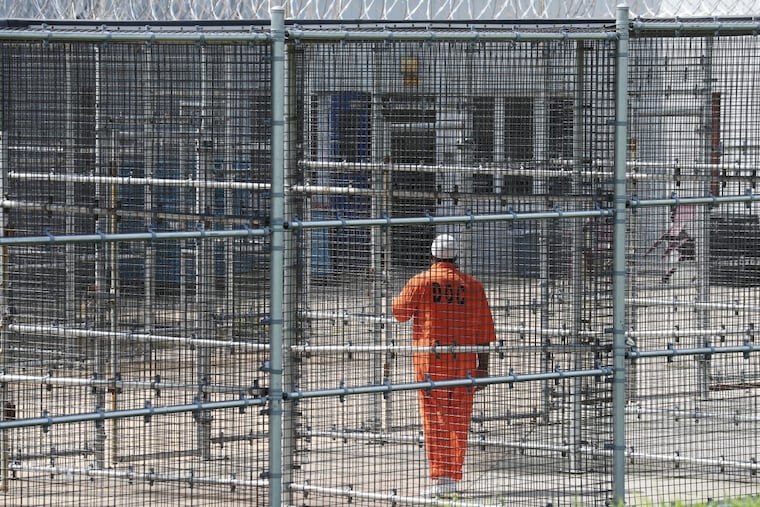Judge: Philly man in solitary for 24 years deserves a chance at general population
Darrick Hall, 47, a Philadelphia man who was sentenced to death for a 1993 murder, has been in a windowless solitary-confinement cell for 24 years - conditions that continued even after his sentence was vacated in October of 2014.

Darrick Hall, 47, a Philadelphia man who received the death penalty for a 1993 murder, has been in a windowless solitary-confinement cell for 24 years — conditions that continued even after his sentence was vacated in October 2014.
Now, a federal judge has found the Pennsylvania Department of Corrections violated his 14th Amendment due-process rights by denying him a meaningful opportunity to move into the general population, and has issued a preliminary injunction.
"We believe that there has been a sufficient showing that he will suffer irreparable harm if he is not granted immediate preliminary relief," U.S. District Judge Curtis Joyner, of Pennsylvania's Eastern District, wrote in the order published Friday.
The Department of Corrections is reviewing the decision, a spokeswoman said. Meanwhile, the prisoner convicted of the robbery and fatal shooting of Donald Johnson, a Coatesville laundry manager, remains in solitary.
In a Jan. 30 hearing, Hall described a life circumscribed by his 7-foot-by-12-foot cell at Graterford state prison.
Even when allowed out to shower or spend an hour or two in an exercise cage, he generally chose not to participate because of the procedure required, which he found humiliating: Each time he left his cell, he would be strip searched, handcuffed and walked on a "dog leash" to his destination.
Hall said his isolation led to anxiety, depression, anger issues, and memory problems. He began experiencing panic attacks in 2013. Hall also described extreme sleep deprivation, because the hallway lights stay on 24 hours a day and guards check in every half hour, frequently shining their flashlights through the bars and onto his face. He said he hadn't slept more than four hours a night in decades.
When he sought therapy, he said, "I was given the same answer every time: These things are not available to me because I'm in solitary confinement."
The injunction follows a February 2017 decision in the cases of death row inmates Craig Williams and Shawn Walker. The U.S. Court of Appeals for the Third Circuit ruled that Pennsylvania cannot keep inmates in death-row solitary after their sentences are vacated without offering meaningful review.
"The Third Circuit ruling, I read it over and over. I really believed it applied to me," Hall said. But his requests went unanswered.
He was represented by the Amistad Law Project and the Abolitionist Law Center. The ALC, along with the Pennsylvania American Civil Liberties Union and three law firms filed a federal class-action suit against the DOC in January, argued that death-row solitary confinement violates not only the 14th Amendment but also the 8th Amendment prohibition on cruel and unusual punishment.
"The holding is a ratification of the Williams decision, and contributes to the growing jurisprudential shift around the issue of solitary confinement," ALC's Bret Grote said.
Hall's conviction for the Dec. 18, 1993 murder stands. His death sentence was vacated after a federal judge found the lawyer representing him in his sentencing was ineffective. The case was placed in indefinite civil suspense after Gov. Wolf in 2015 instituted a moratorium on executions.
There are 154 death-sentenced inmates in Pennsylvania, all housed in solitary. No one has been executed in the Commonwealth since 1999.
According to a recent report published on the website In Justice Today, 115 more are in indefinite solitary confinement. One Philadelphia man in such long-term solitary was released into general population under a federal judge's order last year.
As for Hall, the reasons for keeping him in solitary were not entirely clear.
According to the judge's fact findings, Hall's prison record shows six misconducts in 24 years, none for violent behavior. His last one was in 2014, when he argued with a guard who had cut short his 15-minute Christmas Day phone call home after about five minutes.
Joe Fulginiti, a lawyer for the Pennsylvania Department of Corrections, asked Hall if it was true that he had told the guard "next time you had the chance you would get him?"
Hall said he had not.
Fulginiti also asked questions that appeared to explore the theory that death-row inmates are too dangerous for the general population, because they are men with nothing to lose.
"I want programming and treatment," Hall responded.
"I have a lot to lose."